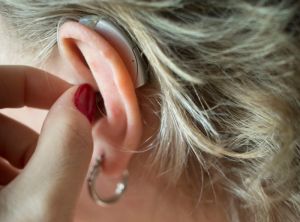|
www.HealthyHearing.com |
Can menopause cause hearing loss and tinnitus?What the research shows
Contributed by Temma Ehrenfeld, and Emily Ostrowski, content manager, Healthy Hearing Key points:
Menopause and perimenopause often bring with them a range of physical changes. Among these, some women may experience hearing loss or tinnitus, raising questions about whether menopause could play a role in these conditions, as well as whether hormone therapy (HT) also sometimes referred to as hormone replacement therapy (HRT) can decrease the risk of developing hearing problems. Can lower estrogen levels harm hearing?Researchers are still teasing out how menopause, and particularly the drop in estrogen levels, affects hearing. For example, a study of 1,830 post-menopausal women found that the volunteers with less estradiol (estrogen levels in the blood) were more likely to have hearing loss. A 2023 review examining gender differences in hearing found that while women in general have better hearing sensitivity than men, that sensitivity drops rapidly with the onset of menopause. Additional research from Drexel's College of Medicine found that lowered estrogen alters the auditory brainstem's (ABR) response values, and the drop in estrogen during menopause may negatively affect the auditory system. "Estrogen withdrawal results in deterioration of the auditory system," said Robert Sataloff, MD, a professor and chair of Otolaryngology – Head & Neck Surgery at Drexel’s College of Medicine. "That is, the natural protective effect of estrogen is withdrawn after menopause." He went on to note that while it appears HRT can protect against this, more research is still needed. Hormone therapy and hearing loss after menopauseIndeed, research on hormone therapy and its effects on hearing loss is mixed. A study published in The American Journal of Obstetrics and Gynecology found that taking estrogen may delay age-related hearing loss in postmenopausal women. However, an analysis with the largest data pool to date on the topic actually found the opposite. 
when looking at the impact of hormones on hearing loss. If you don’t currently have hearing loss, HT could increase your risk, according to a team led by Dr. Sharon Curhan, MD, a physician and epidemiologist at Brigham and Women’s Hospital in Boston. This was true for both pills and patches, and for formulas with estrogen only or combined with progesterone. To get down to the numbers: When Curhan’s team analyzed data for more than 47,000 female nurses spanning 22 years, they concluded that a course of HT for five to ten years increased a woman's risk of hearing loss by 15% compared to a woman not taking HT. Risk increased the longer a woman stayed on HT. Why can menopause cause changes in hearing?Scientists know we have estrogen receptors in ear cells and in auditory pathways, but it’s still unknown exactly how estrogen affects hearing. Sex hormone levels change during a menstrual cycle, and during menstruation, your hearing can become less sensitive. During perimenopause—the years before your ovaries stop releasing eggs and your period ends—your ovaries gradually produce less estrogen. In the last one to two years of perimenopause, the drop in estrogen speeds up. After your period ends, typically after age 45, the ovaries produce little estrogen but you still get some from your adrenal glands and fat tissue. Another key reproductive hormone, progesterone, begins to drop in your thirties. Progesterone, which regulates pregnancy, is the yin to estrogen’s yang: It reduces receptor cells for estrogen. Progesterone doesn’t affect the cochlea directly but it could by reducing estrogen receptors and therefore blood flow to the ear. Does the age when you hit menopause affect your hearing?You might think the link between low estrogen and impaired hearing suggests that women who arrive at menopause at age 50 or older might have a lower risk of hearing loss. After all, it would make sense that women who reach menopause sooner experienced earlier drops in estrogen. However, when Curhan’s team looked at a pool of data on nearly 81,000 nurses, the opposite was true: The women with late natural menopause surprisingly had a 10 percent higher chance of hearing loss. The reason for this finding is unclear, since we don’t have a full picture of all the factors that affect the age of menopause, Dr. Curhan said. Monitor your hearing when starting hormone therapyThe decision to take hormone therapy (HT) to tame menopausal symptoms can be complex. Everyone is unique and there are benefits and risks that you must weigh with your healthcare provider. If you’re considering HT, you’re likely to be offered a combination with progestin (a medication like progesterone) if you still have your uterus. Estrogen alone could cause unwanted side effects, such as increasing your risk of endometrial cancer, so it's more commonly used for women who have had a hysterectomy. It should also be used with caution in women with high blood pressure. If you do opt for HT, Dr. Curhan suggests monitoring your hearing and taking HT only as long as needed. 
Can hormone therapy help tinnitus?The relationship between menopause, hormone replacement therapy and tinnitus is a topic that also needs more study. Some women may experience tinnitus when starting hormone therapy for perimenopause. But studies have also shown that hormone therapy can actually lower the rate of tinnitus in women who are perimenopausal. “We are looking forward to understanding more about risk factors for tinnitus,” Dr. Curhan said. She is studying its relation to menopause and HT. What can women do to protect their hearing?Diet and exercise are important to all aspects of health, including hearing. “We found that people who ate diets that most closely resembled the Mediterranean or DASH [Dietary Approaches to Stop Hypertension] patterns had a substantially lower risk of hearing loss,” Dr. Curhan said. That means eating more fish, vegetables, and whole grains—and less meat and junk food. Learn more: Can a healthy diet reduce your risk of hearing loss? Also be mindful of medications linked to hearing loss. Curhan’s research with the same big data pool found that using the over-the-counter pain-relievers ibuprofen and acetaminophen two or more times a week may be linked to hearing loss, and other studies have found similar links. It's also important to have regular check-ups with your doctor and take proactive steps like steering clear of loud or constant background noise, and getting your hearing checked. If hearing loss is discovered, wear your hearing aids consistently. If you've recently noticed any changes in your hearing and are looking for a provider, visit our hearing directory to find a specialist near you. Related: How to prevent hearing loss Temma EhrenfeldTemma Ehrenfeld is an award-winning journalist who covers psychology and health. Her work has appeared in major newspapers, magazines and websites. Emily Ostrowski, content manager, Healthy Hearing
|
Featured clinics near me
Earzlink Hearing Care - Reynoldsburg
7668 Slate Ridge Blvd
Reynoldsburg, OH 43068

Find a clinic
Need a hearing test but not sure which clinic to choose?
Call 1-877-872-7165 for help setting up a hearing test appointment.


 Emily is an experienced journalist and medical content writer based in Maine. Passionate about delivering enlightening and accurate content, she is committed to empowering people to make informed choices regarding their hearing health.
Emily is an experienced journalist and medical content writer based in Maine. Passionate about delivering enlightening and accurate content, she is committed to empowering people to make informed choices regarding their hearing health.